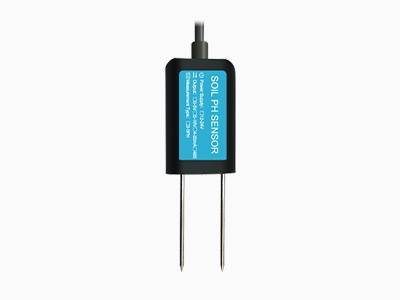A soil pH sensor is a valuable tool that helps farmers, gardeners, and environmentalists assess soil acidity or alkalinity accurately. This article will explore the significance of soil pH, explain the functioning of a soil pH sensor, highlight its applications, and emphasize its role in optimizing plant growth and environmental sustainability.

Significance of Soil pH:
Soil pH refers to the measurement of the acidity or alkalinity of the soil. It affects nutrient availability, microbial activity, and plant growth. Different crops thrive in specific pH ranges, and maintaining an optimum pH level is crucial for maximizing productivity. A soil pH sensor provides precise readings, enabling users to make informed decisions regarding soil amendments, fertilization, and crop selection.
How a Soil pH Sensor Works:

A soil pH sensor consists of an electrode or probe that measures the electrical potential difference between the soil and a reference solution. The probe is inserted into the soil, and the electrical response is converted into a pH value displayed on the sensor or transmitted to a connected device. Some sensors may require periodic calibration to ensure accurate readings.
Applications of Soil pH Sensors:
a) Agriculture:
Farmers use soil pH sensors to monitor soil acidity or alkalinity across their fields. This enables them to adjust pH levels to meet the requirements of different crops and optimize nutrient uptake. Proper pH management can increase crop yields, improve soil structure, and minimize nutrient deficiencies or toxicities.
b) Gardening:
Home gardeners can benefit from soil pH sensors to create optimal growing conditions for various plants. By monitoring and adjusting pH levels, gardeners can ensure healthy plant growth, vibrant flowers, and abundant harvests. It helps in selecting suitable plants for specific soil conditions and planning organic amendments accordingly.

c) Environmental Management:
Environmentalists and researchers utilize soil pH sensors for ecological studies, land reclamation projects, and conservation efforts. These sensors aid in monitoring the impact of human activities, such as mining or industrial contamination, on soil health and ecosystem balance. They assist in restoring degraded soils and promoting sustainable land management practices.
d) Landscaping and Turf Management:
Soil pH sensors are valuable tools for landscapers and turf managers responsible for the maintenance of parks, golf courses, and sports fields. By assessing soil pH accurately, they can optimize lawn and turf health, adjust fertilizer applications, and prevent the growth of undesirable weeds or invasive species.
Advantages of Using Soil pH Sensors:
a) Precision:
Soil pH sensors provide real-time and accurate readings, allowing for precise pH adjustments based on plant requirements.

b) Time and Cost Savings:
By identifying soil pH issues promptly, users can take immediate remedial actions, reducing the risk of crop losses or poor plant performance. This saves time, money, and resources.
c) Data Logging and Analysis:
Many advanced soil pH sensors offer data logging capabilities, enabling users to track pH variations over time. This data can be analyzed to identify trends, make informed decisions, and implement long-term soil management strategies.
d) User-Friendly:
Soil pH sensors are designed to be user-friendly, with intuitive interfaces and easy-to-understand readings. They are suitable for both professional and amateur use.
Conclusion:
A soil pH sensor plays a vital role in understanding soil health and optimizing plant growth. By accurately measuring the soil’s pH level, farmers, gardeners, and environmentalists can make informed decisions regarding soil amendments, crop selection, and land management practices. With its wide range of applications, a soil pH sensor empowers individuals to create healthier, more productive, and sustainable ecosystems. By harnessing the power of soil pH sensors, we can unlock the secrets that lie beneath our feet and cultivate a greener future.


No comments yet